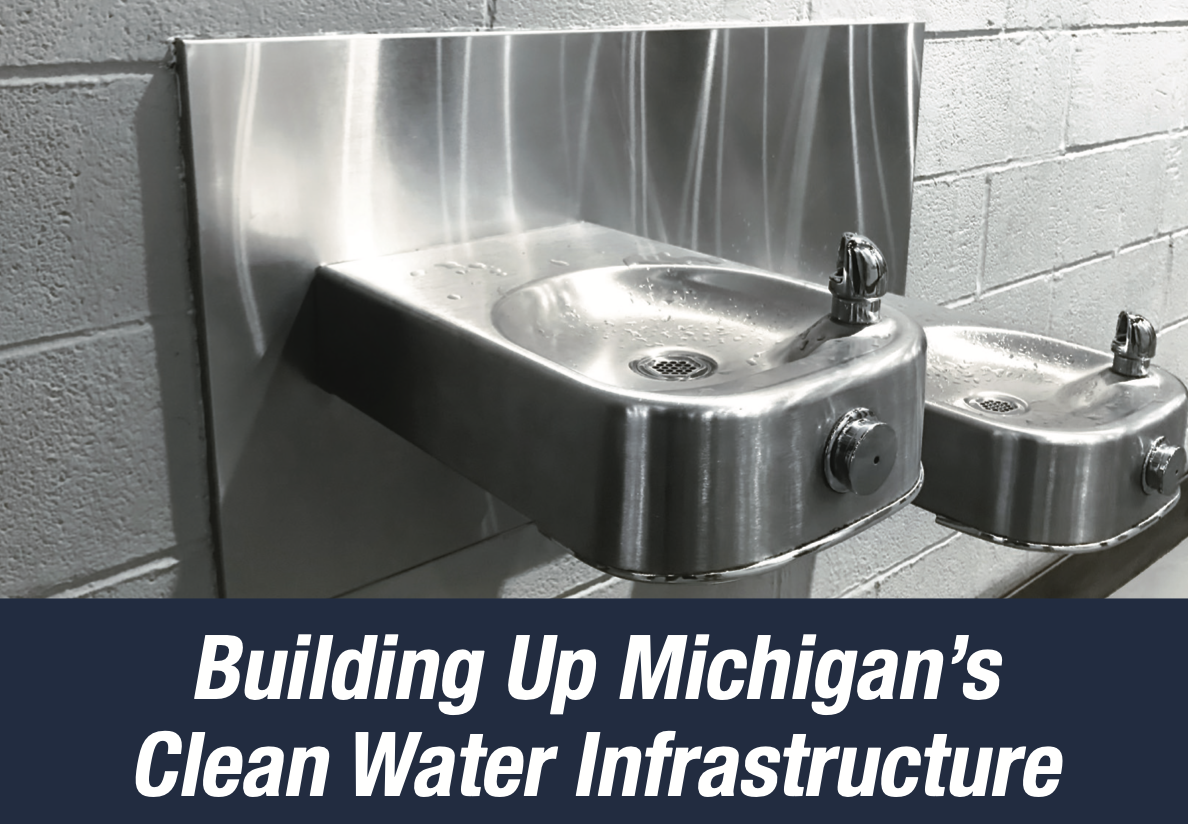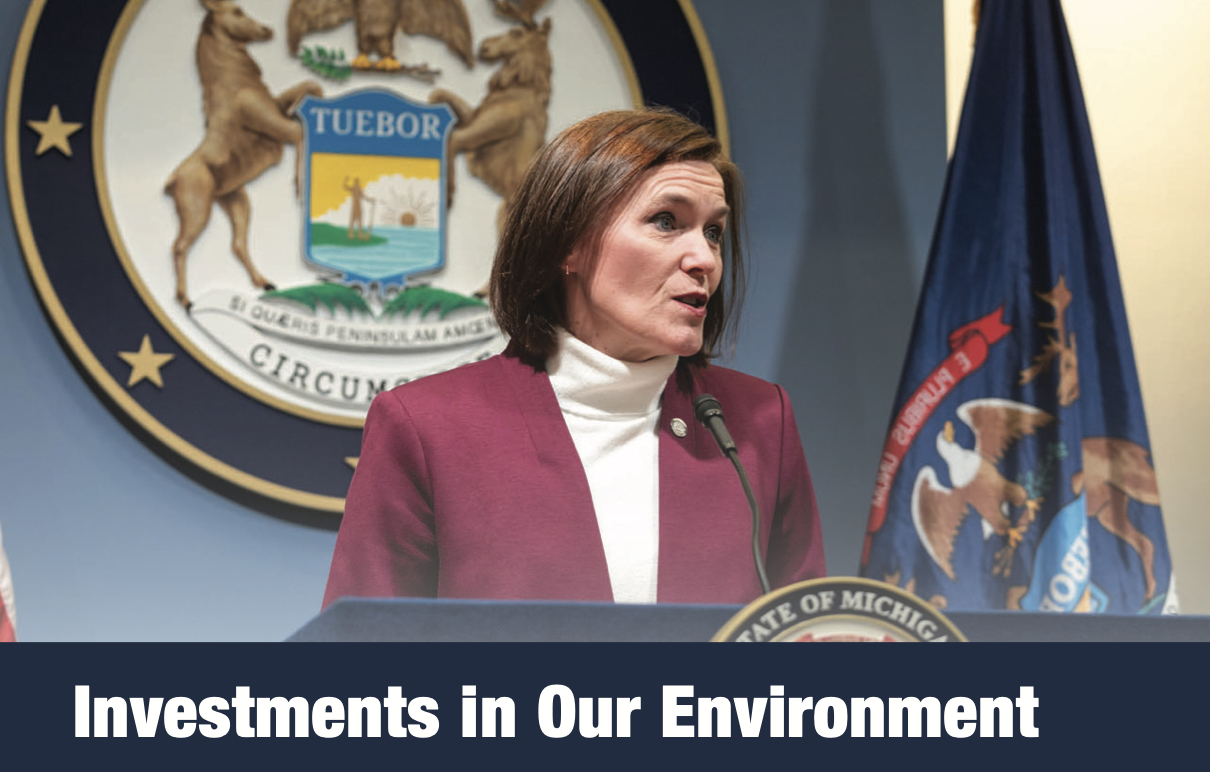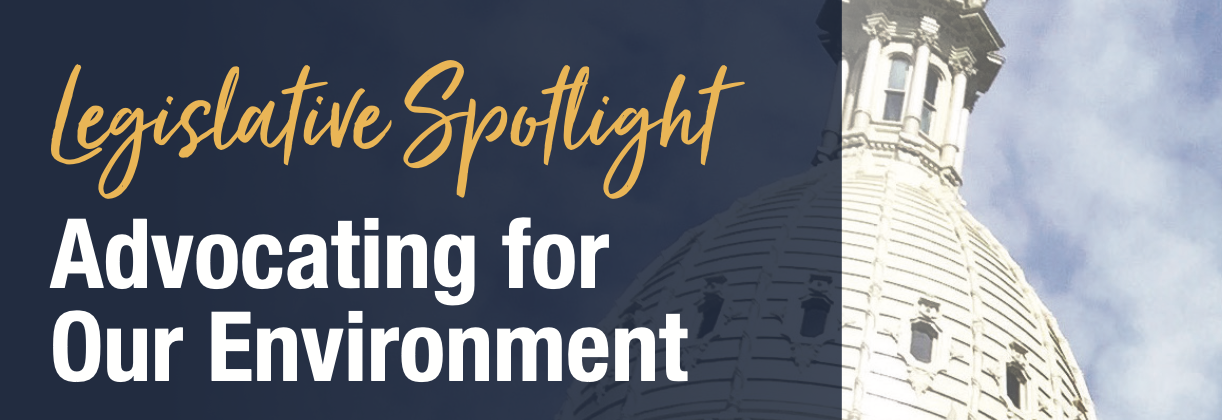
Dear Neighbor,
It’s my honor to serve our West Michigan community in the Michigan Senate, where advancing environmental protections for the greater good of our state is one of my top priorities. From tackling toxic PFAS chemicals in our drinking water to working to expand protections for victims of environmental contaminations, I am proud of my track record of fighting hard for the health and safety of our residents and our environment — especially as we continue grappling with an increasing number of severe weather events and extreme temperatures.
This newsletter provides an update on our legislative efforts to safeguard our environment, build up our clean energy infrastructure, preserve the integrity of our natural resources, and so much more.
As always, I’d love to hear from you about proactive ways we can work together to protect our state’s natural resources. Please feel free to reach out to my office to share your perspective on this or any issue — we are here to serve you.
Sincerely,

Winnie Brinks
State Senator
District 29
Charting A Clean Energy Future
Fresh Air, Clean Water, & Good Jobs
For years, Michigan citizens have called for decisive action to address concerns about climate change — concerns that have long gone unaddressed. Last year, my legislative colleagues and I took bold steps to combat the disastrous effects of our climate crisis and create a more sustainable state for future generations.
Our Clean Energy Future plan — comprised of Senate Bills 271, 273, 277, 502, and 519 — are integral to positioning our state as a national leader in clean energy, while also diversifying Michigan’s economy and supporting workers, farmers, and consumers.
Boosts Energy Efficiency & Lower Costs
In order to improve long-term energy affordability, it’s vital we find ways to boost
our energy efficiency. This legislative package includes new requirements for utility companies, allowing us to see an increase in electric efficiency standards from 1% to 1.5% for electricity energy waste reduction, as well as an increase in natural gas efficiency standards from 0.75% to 0.875% for gas energy waste reduction by 2026. These new laws also expand the availability of efficiency programs for customers, helping to further lower costs for folks struggling to make ends meet.
Promotes Environmental Justice & Public Health
For too long, Michiganders — particularly those from disadvantaged communities
— have not been properly involved in the decision-making process regarding utility companies’ energy plans. With our Clean Energy Future proposal, we’re giving everyone a seat at the table and creating more opportunities for public participation by requiring the Michigan Public Service Commission (MPSC) to host at least four public meetings each year. Additionally, this legislation requires the MPSC to consider the impact of energy policies and energy plans on environmental justice, public health, and the health of our climate.
Supports Michigan Workers in the Transition to Clean Energy
Here in Michigan, we’re proving that business and environmental interests can work together to create the economy of the future. Not only are we building a greener, more sustainable state, we are doing so in a way that will bring new businesses to Michigan and create thousands of good-paying jobs in the process. By establishing the brand- new Office of Community and Worker Economic Transition, our Clean Energy Future plan will ensure Michigan workers — from welders to electricians to pipefitters — reap the benefits as we build out new clean energy infrastructure.
Moves Michigan to 100% Clean & Renewable Energy
A core tenet of the Clean Energy Future plan is the expansion of Michigan’s Renewable Energy Standard. This new policy puts Michigan on a path towards achieving 50% renewable energy by 2030, 60% renewable energy by 2035, and 100% clean energystatewide by 2040. To ensure we reach these goals, our new energy laws also break down barriers to rooftop solar and other wind and solar projects, giving more Michigan consumers and farmers the power to generate their own clean energy.

Clean water infrastructure is essential for maintaining healthy lakes and a thriving environment. Unfortunately, our state’s water infrastructure is outdated, poorly rated, and in need of repair after decades of neglect.
Throughout my time in the State Legislature, I have focused on securing targeted investments and implementing legislation that help to preserve the health of our Great Lakes and enhance our water infrastructure. These efforts include:
-
Allocating $600 million to replace lead service lines and rebuild sewers in our state’s most overburdened communities.
-
Passing Senate Bills 88 and 89, which require schools and child care centers to install water filters that protect children from the dangers of lead in drinking water.
-
Enacting Senate Bill 14 to repeal the state’s “no stricter than federal” law that prevented Michigan officials from strengthening environmental and public health protections that exceeded federal standards. This is especially pertinent to the work of addressing PFAS contamination and keeping residents safe here in West Michigan.
-
Securing $3.7 million in federal grants to support the National Wastewater Surveillance System and improve information sharing between partners, accelerating the implementation of wastewater surveillance for public health action.
-
Leveraging $1 million in federal grants for the Great Lakes Restoration Initiative Program to support two green infrastructure projects that address polluted stormwater runoff.

In addition to taking legislative action to tackle the climate crisis, the Michigan Senate prioritized our environment in the 2024 state budget. Through targeted, meaningful investments aimed at protecting Michigan’s natural resources and expanding opportunities for folks to get outdoors, we’re ensuring everyone who calls our state home can enjoy the benefits of our diverse landscapes. Some of these investments include:
- $125 million to the Dept. of Education and Dept. of Environment, Great Lakes, and Energy to help school districts purchase clean, electric school buses.
- $64 million to complete construction of a dam project to keep invasive Asian carp out of the Great Lakes.
- $30 million for the Renewable Ready Communities program, helping to incentivize renewable energy projects throughout the state.
- $20 million in infrastructure grants for the city of Wyoming’s transformational City Center project, which includes 4.6 miles of trails linking greenspaces to a vibrant and walkable urban center.
- $14 million to help implement the master plan at John Ball Zoo, whose mission is to preserve wildlife and wild places and provide world-class education about conservation to West Michigan and the entire state.
- $2.2 million for the Michigan Climate Corps, empowering communities to tackle climate change and protect our environment for future generations.
- $1 million to provide assistance to communities for pollution prevention, monitoring and other remediation activities.

Making Energy Efficiency More Available to Michiganders
Senate Bills 302 and 303 help more Michigan businesses make investments to lower their energy costs and environmental impact, conserve water, mitigate lead and PFAS, and other projects.
Transforming Obsolete & Contaminated Property
Senate Bill 289 expands Michigan’s Brownfield Plan program to make more projects, which are complicated by the presence of contamination or blight, more feasible — a key priority for Grand Rapids in addressing the need for additional housing.
Improving Air Quality
Senate Bill 26 creates the Air Quality Enforcement and Mitigation Fund, which requires fines paid by polluting companies to be directed back to the community to help alleviate harm caused.
Increasing Fines for Illegal Dumping
House Bill 4325 raises the fine for those who illegally dump large amounts of trash, holding them accountable for the cost of cleaning up their mess.
